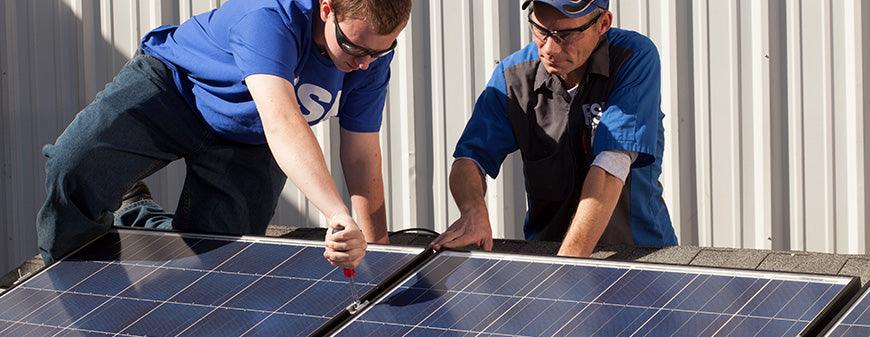Your Cart is Empty
Free shipping over 12.99 丨 30-Day Money-Back Guarantee 丨shipping: 2-3Days
Free shipping over 12.99 丨 30-Day Money-Back Guarantee 丨shipping: 2-3Days

Electricians already play a very important role in the world. They keep the lights on in cities and towns around the world. Their wiring jobs power the factories that make essential items like cars and computers. And, without electricity, homes and businesses would not function: appliances, computers and the Internet would all flicker.
Today, electricians have another reason to be satisfied with their work. The growing trend to replace fossil fuels that generate electricity with cleaner alternatives, such as wind and solar, means that modern electricians can also help protect the environment.
In fact,the Occupational Information Network (O*NET)describes the electrician industry as "an occupation with increased environmental demand. This means that technologies and activities involved in the environmental economy are likely to increase the demand for electrician employment without significantly changing the nature of the work. Specifically, electricians could find work in environmentally friendly construction in the coming years.

Environmentally friendly building is the practice of building homes, offices and other structures that have minimal impact on the environment. Sustainability is the goal at every step of the construction process, from design to material selection to building practices.
This means using recycled or renewable materials and designing structures to conserve as much water and energy as possible.
Skilled workers are often the last people to enter a green building site. After the building has been designed by the architect and built by the construction crew, these professionals use their unique skills to further understand its environmental impact.
Electricians install and maintain the building's energy systems and take steps to improve efficiency. They can install motion sensors to automatically turn off lights when a room is unoccupied. Electricians can also equip buildings with green products, such as smart power strips that prevent plug-in electronics from unnecessarily consuming energy.
In some cases, electricians can connect a building's energy system to renewable energy sources, such as solar photovoltaic panels.
As of 2017, more than 250,000 Americans were working in the solar industry. Electricians may account for some of these jobs. The Office of Energy Efficiency and Renewable Energy classifies electricians who work with solar photovoltaic panels as "electricians with solar expertise.
These electricians, also known as "wind technicians," are responsible for assembling, wiring, and maintaining turbines and tower assemblies that use wind energy to produce energy. in 2017, twice as many Americans worked in wind energy production as worked in coal mining. In 2017, wind energy created 100,000 jobs in the United States.
Electricians are increasingly seizing career opportunities in the smart home revolution. Building automation systems integrate and connect a building's electrical, mechanical and plumbing systems to software programs so they can be easily monitored and controlled remotely. They promote energy efficiency, which is why many homeowners seeking LEED certification are choosing them.
According to ResearchAndMarkets.com, the global market for building automation systems is expected to grow to $166.99 billion by 2026. Increased demand for energy-efficient systems and improvements in Internet of Things (IoT) and sensor technologies will be the driving factors.
Between the expected increase in jobs in the coming years and the opportunity to contribute to a cleaner environment, there's a lot to be said for a career as a green electrician. From solar to wind to smart homes, these tradesmen can choose to work in areas that are clean and energy efficient.
1.10 must-read books for electricians in 2021! Recommended by Master Electricians
2.Best Books For Electricians|Must-read books for those who want to become electricians
3.5 Best Home Electrical Wiring Books for Beginners | Electricians Guide
4.Top And Best Books And Guides For Electricians And Apprentices | Knoweasy Electrician Guide
5.The Best Electrician Books For Beginners: Top Six Sellers In 2022
1.Best Clamp Meters: Our Top 10 Meters for Electricians(Updated 2025)
2.The Best Non-Contact Voltage Tester: Certified by 20 Years of Electrician Experience
3. 7 best diagonal shears/side shears pliers! Higher precision and efficiency
4. Best Electrician's Knife: Top 7 in 2022 (Pocket, Tortoiseshell and Wire Stripping)
5.Top 11 Electrician's Tools Belts and Bags Worth Investing in 2023
6.The Top Heat Guns of 2023: Find the Best Tool for Your Next Project
7.The 10 Best Smart Gloves for Electricians丨Safety and Tech Savvy at the Same Time
8.Best chainsaw sharpeners of 2023:Keep your power tools sharp
9.Best Tin Snips Of 2023: Cutting Thin-Gauge Metals with Ease
10.Best 10 AWG Wire | Helps electricians choose the right battery
Author: Leb
Personal blog: https://lebshare.blogspot.com
Comments will be approved before showing up.